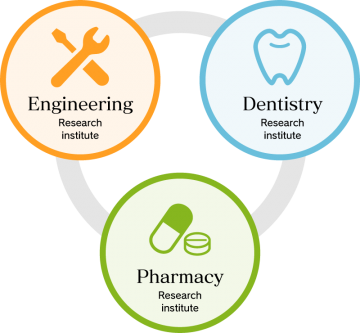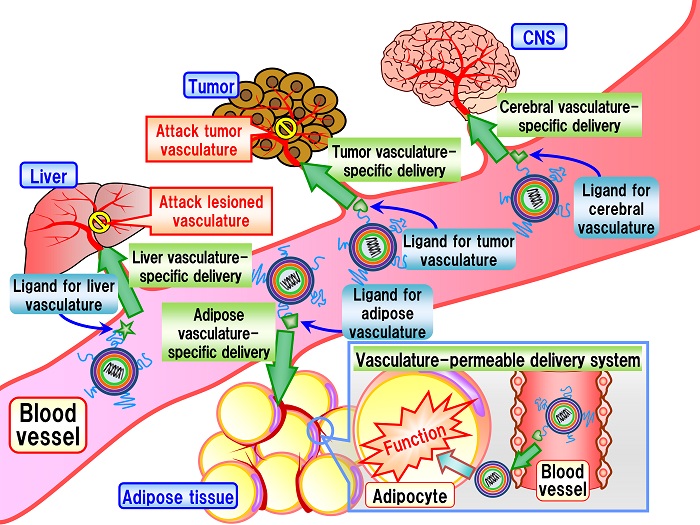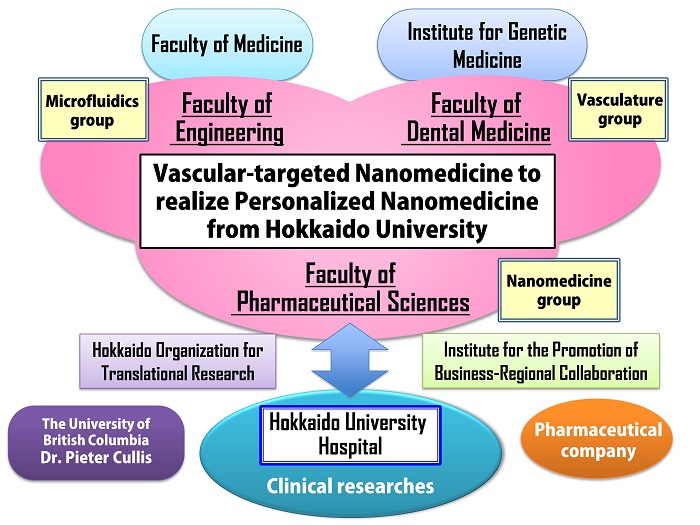-
Outline
About this project

Towards Vasculature-Nanomedicine
- Personalized cancer medicine targeting blood vessels based on companion diagnosis.
- Personalized nanomedicine to cure metabolic syndromes.
- Breakthrough nanotechnology to overcome blood-brain-barrier.
- Training young researchers on vascular-nanomedicine.
Background

This Project is the first research project to be conducted between the Faculty of Pharmaceutical Sciences (represented by the Laboratory of Innovative Medicine) and the Faculty of Dental Medicine (represented by the Laboratory of Vascular Biology: currently Vascular Biology and Molecular Pathology), which started in 2009 with the goal of developing innovative nanomedicine at Hokkaido University. Although this Project had a 5-year limit (2009 to 2013), it was extended for an additional 5 years (2014 to 2018), since it was more successful than expected, not only from the research view point but also from an educational view point. In August 2018, the first siRNA nanomedicine OnpattroTM has been approved by the FDA, which opened the era of “Nucleic Acids Nanomedicines”. To cross over the “Death Valley” that inhibited the clinical translation of nanomedicines, we introduced “Microfluidics”, an innovative nanotechnology that is supported by the Faculty of Engineering (Laboratory of Bioanalytical Chemistry). Starting in April 2019, we initiated a new collaboration with the goal of achieving the clinical translation of Vascular Targeted Nanomedicine at Hokkaido University.
General introduction
A paradigm-shift occurred in the field of drug research and development, in which our focus shifted from low molecular compounds to antibodies and next generation medicines, namely, nucleic acids medicines. In 2018, Patisiran (OnpattroTM) was approved by the FDA as the first siRNA nanomedicine, which opened the era of nucleic acids medicines. This Joint Research Project at Hokkaido University aims to integrate diagnostic systems based on the vasculatures in diseased tissues and develop a multifunctional envelope-type nano device (MEND) that will permit the selective delivery of nucleic acids such as siRNA/mRNA/pDNA to target tissues which can be constructed via a microfluidic flow system for translation into clinical realities. The goal of this Project is to achieve Personalized Nanomedicine for the treatment of tumors, metabolic diseases, brain metastasis, central nervous system diseases. The long-term goal of this Project is to develop innovative nanomedicines originated in Japan, especially Hokkaido University and contribute to human health through medical innovations.
Objective
This Project was initiated in 2009 as the “Vascular-targeted Innovative Drug Delivery System”, and was the first Joint Project at Hokkaido University between the Faculty of Pharmaceutical Sciences and the Faculty of Dental Medicine, which was supported by the Special Education and Research Expenses of the Ministry of Education, Culture, Sports, Science and Technology of Japan. The Laboratory of Innovative Nanomedicine was founded in the Faculty of Pharmaceutical Sciences and Laboratory of Vascular Biology (currently, Vascular Biology and Molecular Pathology) in the Faculty of Dental Medicine. This Joint Project was extended in 2014 for another 5 years as “Clinical translation of the Vascular-targeted Innovative Drug Delivery System”. Under close communications, two teams cooperated as well as competed to achieve break-through research productivities, as represented by the top 10% percentile of research papers that exceeded 30% out of 178 original/review papers in 10 years (from 2009 to 2018). In addition to these high-quality research activities, this joint project has encouraged 36 young scientists to pursue Ph D degrees and has resulted in the promotion of 27 young faculty members (associate professor, assistant professor, postdoctoral fellow).

[Tissue-selective delivery by vascular-targeted nano devices]
This project was renewed in April 2019 as “Vascular targeted Nanomedicine to realize Personalized Nanomedicine from Hokkaido University” by linking the Laboratory of Bioanalytical Chemistry to cross over the “Death Valley”. Therefore, this Joint Project is jointly sponsored by 3 different faculties, namely, the Faculty of Pharmaceutical Sciences, the Faculty of Dental Medicine and the Faculty of Engineering and is also supported by the Hokkaido University Hospital, Faculty of Medicine, the Institute for Genetic Medicine, the Institute for the Promotion of Business-Regional Collaboration and the Hokkaido Organization for Translational Research.
Organization of this project




